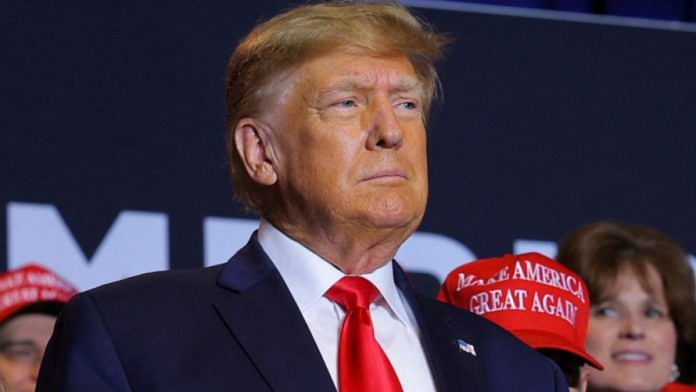New Delhi: The Trump administration has revised its policy on Taiwan’s independence by revising a previous US State Department factsheet that opposed the island’s independence from China, in what is a significant change in policy.
The factsheet earlier said that the US opposed “any unilateral changes to the status quo from either side; we do not support Taiwan independence; and we expect cross-strait differences to be resolved by peaceful means”. The statement, “we do not support Taiwan independence”, was removed from the factsheet on 13 February this year.
The move came days after two dozen Republicans in the US House of Representatives endorsed a resolution encouraging President Trump to recognise Taiwan formally.
The line on Taiwan’s inclusion in international organisations was also revised in the factsheet to say that the US will support Taiwanese participation “wherever applicable”, with “where statehood is not a requirement” removed. Taiwan’s dispute with China should be resolved peacefully in a way acceptable to both sides, the factsheet added.
The updated factsheet now includes US-Taiwan collaboration on Pentagon technology and semiconductor development initiatives. A sentence has been included, highlighting the Pentagon’s collaboration with Taiwan’s National Science and Technology Council.
Despite updating the factsheet, the US emphasised its commitment to the “One China” policy, which acknowledges China’s claim that Taiwan is a part of China, with Beijing not taking a position on Taiwan’s sovereignty.
The United States also reiterated its dedication to preserving peace and stability in the Taiwan Strait, opposing any unilateral changes to the status quo from either side, and advocating for peaceful cross-Strait dialogue, according to a Reuters report.
In a swift response to the US move, the Taiwanese government welcomed the change, according to a report in Taipei Times. The report quoted a statement of foreign affairs minister Lin Chia-lung, expressing gratitude to the US State Department for reaffirming its support for Taiwan with “positive, Taiwan-friendly language”.
Lin thanked the Trump administration for upholding the Taiwan Relations Act and the “six assurances”, which aid Taiwan in strengthening its defence, economic, and societal resilience, promoting peace and stability across the Taiwan Strait, his statement added.
Since severing official ties with Taiwan (the Republic of China) and shifting diplomatic recognition to the People’s Republic of China (PRC) in 1979, the US has consistently reiterated its stance of not supporting Taiwan’s independence.
Complicated history, uneasy relationship
After the update, tensions flared up between Washington and Beijing.
China accused the US of “gravely back-pedaling” on its stance on Taiwan, adding that Washington was sending an incorrect message to “separatist forces” on the island.
Beijing also termed Washington’s apparent “routine update” as “another example of the US side clinging to the wrong policy of ‘using Taiwan to contain China’.”
“The US State Department revised the fact sheet of US-Taiwan relations, which seriously regressed its position on Taiwan-related issues, seriously violated the one-China principle and the three China-US joint communiqués, seriously violated international law and basic norms of international relations, and sent a serious wrong signal to the ‘Taiwan independence’ separatist forces,” China’s foreign ministry said in a reaction.
“We urge the US to stop emboldening and supporting Taiwan’s independence and avoid further damaging China-US relations and the peace and stability of the Taiwan Strait,” ministry spokesperson Guo Jiakun said at the daily media briefing.
Taiwan is considered a self-governed democracy by many, including the US, but claimed by China as a part of its territory. So far, Taiwan views itself as a de facto independent state but maintains a delicate relationship with Beijing. It has never formally declared independence, with China warning that such a move could result in conflict.
While the US officially recognises the People’s Republic of China (PRC) as the government of China, it maintains unofficial relations with Taiwan. Taiwan has increasingly engaged in diplomatic and economic activities with the US, particularly in technology and trade.
February 13’s change in language has drawn attention due to the significance of US statements on Taiwan, as minor adjustments are closely scrutinised by both Beijing and Taipei. While former US President Joe Biden previously pledged military support for Taiwan, the US State Department later withdrew such statements.
Taiwan, officially known as the Republic of China, operates as a self-governing democracy but is formally recognised by only a few countries. However, it maintains unofficial relationships with much of the global community, including the US.
The 1979 Taiwan Relations Act obligates Washington to assist Taiwan in its defence, but it does not specifically require military intervention in the event of a Chinese invasion or blockade.
(Edited by Sudha V.)
Also Read: Why China has launched mega military drills around Taiwan and what do these entail




